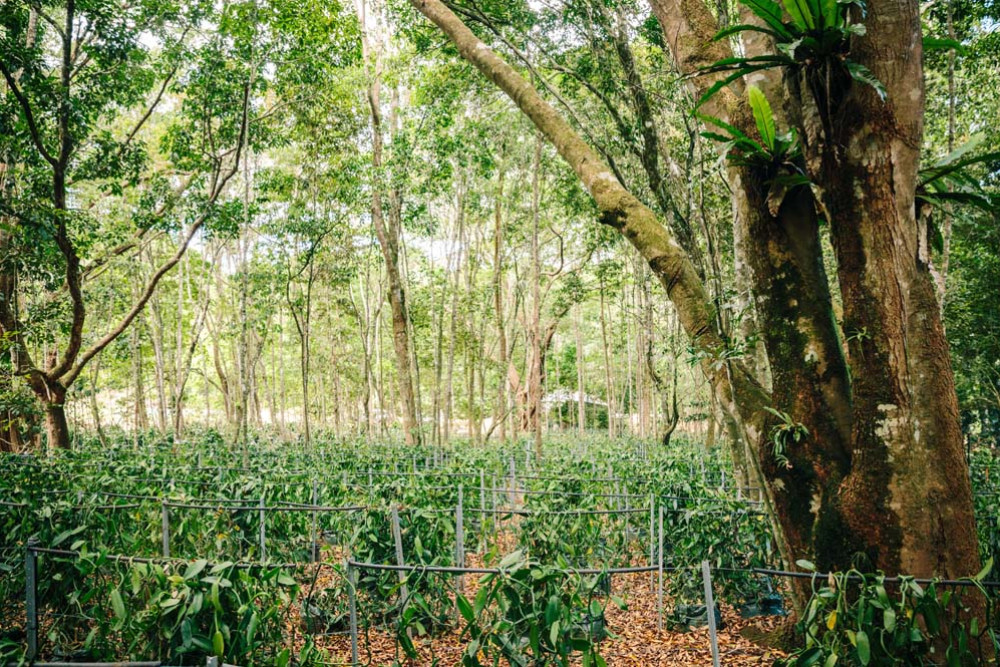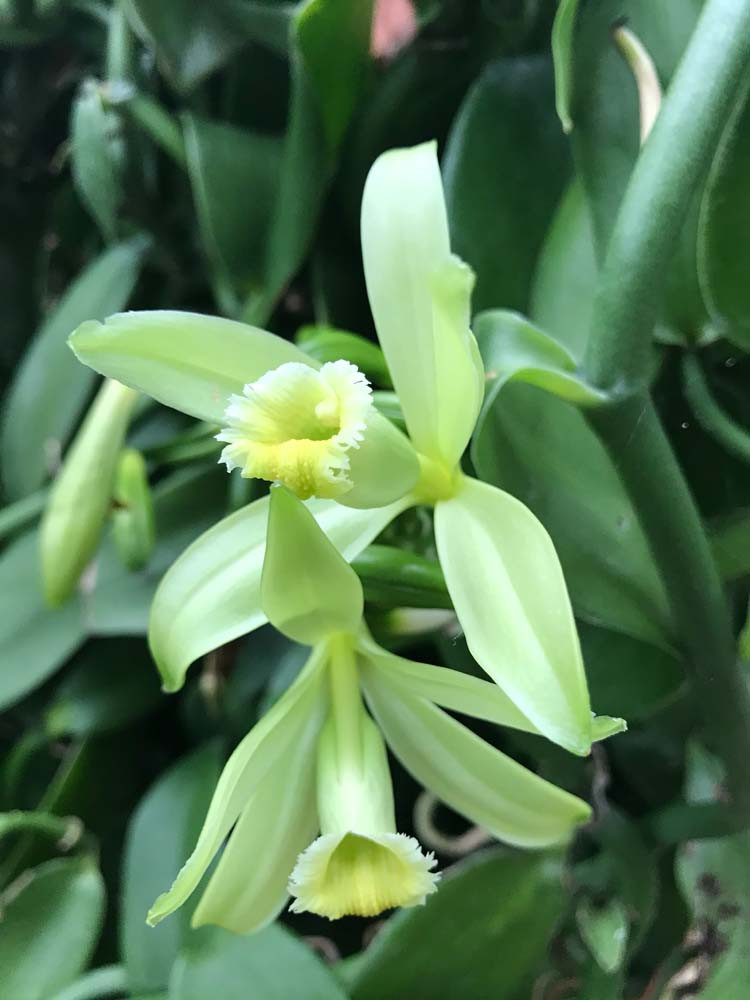On The Land
25 November, 2023
Wild about vanilla
It’s not every day that you hear about a toothpick being an indispensable component of a farming operation, but for Wild Vanilla located at Malanda, it is exactly that.

Wild Vanilla co-owner Rebekah Freeman said it was the most valuable item they had.
“The toothpick would have to be the smallest farm tool on earth and we cannot run our farm without it!” Rebekah said.
“Vanilla flowers are only open for a few hours each morning and require hand fertilising with a toothpick in order to produce a single bean.
“If they are not fertilised within this time frame, we lose the flower and potential bean forever.”
The business name Wild Vanilla was derived from the fact that the operation’s vanilla is grown mostly under the canopy of the rainforest as opposed to in poly tunnels or shade houses.
“My dad and I were interested in the fact that vanilla grows from an orchid vine and wanted to learn more about it,” Rebekah said.
“It grew into a passion and we love the challenge of creating a high-quality, consistent product together as a family.
“We have been growing and experimenting with vanilla as a hobby for many years, but pursued it as a business in just the last two years.”

The team members involved in the business include Rebekah, her brother and parents. They all work full time and are spread out between Atherton and Brisbane. Farm manager India Whitton helps with the daily running of the farm.
Vanilla Planifolia is grown exclusively as it has the highest percentage of vanillin of all commercially grown varieties.
The vanilla plantation currently comprises of roughly 1500-2000 plants.
Production is steadily increasing each year to several hundred kilograms per annum.
Wild Vanilla is currently focusing on the farm’s production and on producing the highest quality and consistent product possible. It intends to increase the size of its operation in the future.
“The vanilla orchid is the only food producing orchid,” Rebekah said.
“It requires a lot of knowledge, attention and time to produce beans.
“It prefers to grow above ground in mulch or in an orchid mix.
“We grow on trellises and use the natural rainforest canopy to control light and humidity.”
Vanilla is not grown from seed and cuttings are used to propagate the plants instead.
It requires a delicate balance of light, humidity, nutrients and temperature in order to produce beans. This greatly minimises the potential growing locations available to it.
“Plants take a number of years to mature before they flower,” Rebekah said.
“Fertilising flowers requires a lot of attention. After the flowers have been pollinated, it takes another nine months for the beans to grow to maturity.
“We harvest the beans by hand on a daily schedule. We look for signs of readiness and then proceed to hand wash, dry, blanch, sweat, dry and cure each bean.”
Vanilla beans require a very labour intensive and long curing process.
“We have formulated our own highly scientific approach to this to ensure our customers receive premium quality and consistently flavoured products,” Rebekah said.
“The beans then take up to six months to be processed and cured and this is reflected in our unique flavour profile.
“Vanilla beans are like coffee beans. The curing process greatly affects the flavour profile of our products.
“With the help of some coffee experts and food scientists, we have been able to create a consistent vanilla bean that has a strong chocolate base note with floral and raisin top notes.”
Rebekah feels that vanilla is an emerging industry on the Atherton Tablelands.
“I would say that yes, vanilla is in the early stages of people trying to break into the industry,” she said.
“It requires a very high-level of attention and knowledge and a significant investment of money and time over a number of years to gain a return.
“There is some limited opportunity to expand. The vanilla orchid can only tolerate a very limited range of growing conditions in order to be a viable plant and this restricts the potential growing areas.”
Scrub turkeys and kangaroos are considered to be the operation’s biggest threat and challenge as they like to dig up the mulch and nibble on leaves.
“We have managed this by fencing the farm,” Rebekah said.
“Another hurdle is the lack of accurate research for producers to access. There is a lot of misinformation spread about the requirements for growing and producing high-quality vanilla.
“We relish overcoming the challenges of growing and producing a premium product as a family and are very grateful for all the support, encouragement and advice from other farmers.
“We enjoy working as a team and connecting with other farmers and passionate food producers.
“We have a passion for vanilla and absolutely love the flavour and smell of it.
“Vanilla invokes delicious childhood memories, imparts amazing flavour to both savoury and sweet dishes and drinks, has the ability to reduce bitterness in various foods (eg. chocolate, marmalades, coffee) and has mild anti-bacterial properties.
“It is also a highly versatile ingredient and is used in a very wide range of products.
“We are 100% organic and are planning to obtain certification soon. Our goal is to produce high-quality, organic, Australian vanilla.
“Vanilla requires a very high-level of input and labour to produce something worth selling and this is reflected in its price point.
“It is possible to obtain cheaper imported vanilla from third world countries, however the quality is substantially less and often involves a lot of mistreatment of workers, undercutting and a lack of fair trade principles and standards.
“We are currently producing vanilla beans, powder, syrup and three types of extracts to meet different market needs.
“We mostly sell to commercial food producers but customers can access our retail products online at our website wildvanilla.au and at specialty food stores in various locations across Queensland.
“We are very pleased with the feedback and interest shown in our products and were recently invited to participate in the Good Food and Wine Show in Brisbane.”
For further information, contact Rebekah Freeman on 0477 128 569 or visit www.wildvanilla.au


